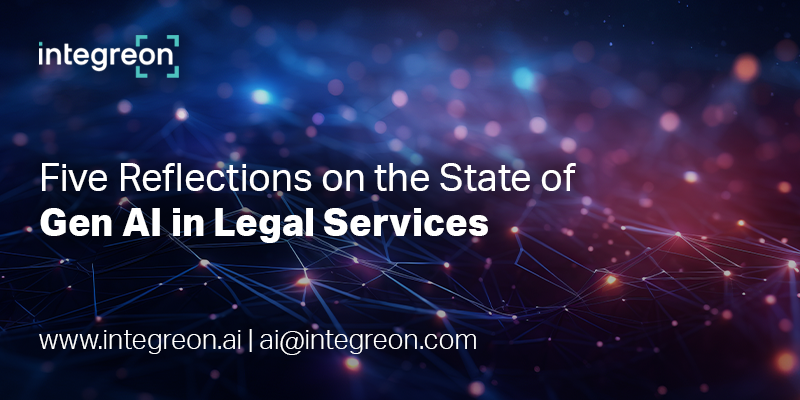I spent the last week in the UK, meeting with the Integreon’s strategic partners, and our London team. There, I also spent a lot of time listening to legal counsels across industries. Together with the latest announcements from ChatGpt 4.o, Google Gemini, and Anthropic Claude, here are my five reflections on where Gen AI stands relative to legal ops / legal services:
1. Gen AI and AI are both revolutionary and evolutionary
Most senior legal executive leaders I meet see Gen AI as a clear disruptor that has already started and will continue to revolutionize the legal services industry. There is a recognition that the legal profession tends to be conservative and cautious. At the same time, over the last two decades, how law is practiced today has changed dramatically thanks to the introduction of many technologies over time in an evolutionary manner. Thus, we can think of Gen AI adoption in this space as a classic Amtrak train: not yet a high-speed bullet train per se, but before you know it, overnight, you find yourself in a different city.
2. Gen AI can shift the focus of the legal profession from reactive to proactive
Most legal services today are focused on resolving litigation after disputes and incidents. As Gen AI makes legal research and CoCounsel cost-effective and easily accessible, trading partners can now more easily discover legal risks and develop proactive mitigation strategies based on proven case laws, while reducing the workload on the in-house counsel.
3. Cost is the #1 concern, followed by data privacy for Gen AI adoption.
Surprisingly, the inaccuracy of the Gen AI response is the last concern for many general counsels. This does not mean accuracy is less important. It does mean Gen AI has crossed the threshold of viability. Now the center of innovation is pivoting toward value generation and securing data privacy with confidence.
4. Vertical specialization for accuracy and performance
Not all Gen AI tools are created equal. While large language models (LLM) will continue to advance at record pace with near-magical breakthroughs, much of the latest progress is in application and democratization of access and ease of use, not necessarily in the underlying LLM core technologies.
In legal services, context and nuance matter. A deposition summary can differ materially from a contract summary in both content and the purpose of the summary for the next best actions. Thus, vertical specialization building on the horizontal generic LLMs is better suited for this purpose as they make the inference process more accurate and efficient. For this very reason, we formed a strategic partnership with ContractPodAI and LeAh in the contract services space.
5. Talent and core competency development inform and sustain service and technology partnership
To ask the right question as an input prompt requires deep domain knowledge, critical thinking, and well-trained skills in prompt engineering patterns and best practices. Advanced prompt engineering today is the new programming language for Gen AI tools. With the pace of change we’re seeing today, service providers need to train AI/Gen AI talents at scale. This can be done with the advantage of process expertise and economies of scale; Legal service providers can build out rich prompt libraries to train delivery staff at scale.
It’s a bit like when Henry Ford invented the Model T: a lot more drivers had to be trained so that Henry Ford could maintain the pace of production and thus create a virtuous cycle of mobility transformation.
Looking to the next few years, close partnerships between service and technology partners can help in-house counsels adopt Gen AI and achieve value for the business faster and easier.


